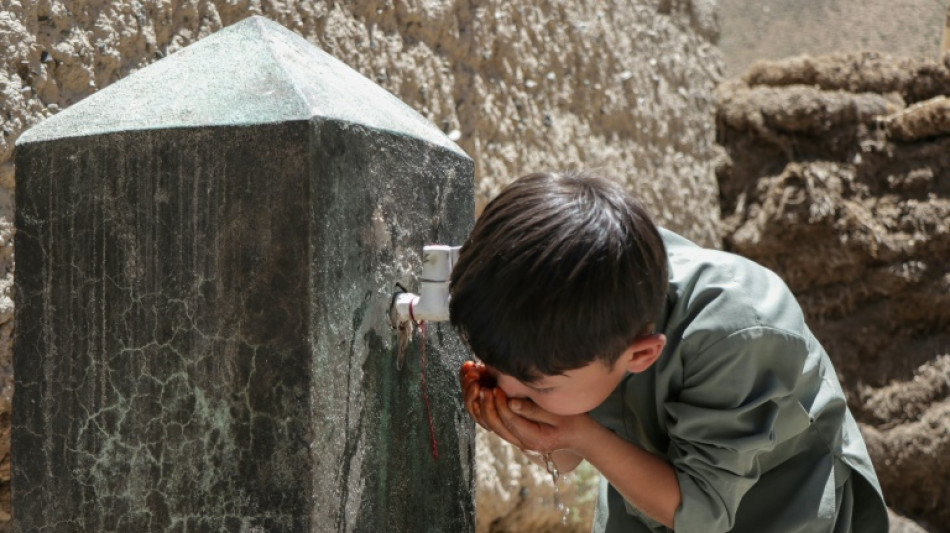
-
 Late Guirassy winner for Dortmund trims Bayern's lead atop Bundesliga
Late Guirassy winner for Dortmund trims Bayern's lead atop Bundesliga
-
'Free the mountains!": protest in Milan over Winter Olympics

-
 Gyokeres double helps Arsenal stretch Premier League lead
Gyokeres double helps Arsenal stretch Premier League lead
-
Six Nations misery for Townsend as Italy beat sorry Scotland

-
 Spain, Portugal face fresh storms, torrential rain
Spain, Portugal face fresh storms, torrential rain
-
Opinions of Zuckerberg hang over social media addiction trial jury selection

-
 Over 2,200 IS detainees transferred to Iraq from Syria: Iraqi official
Over 2,200 IS detainees transferred to Iraq from Syria: Iraqi official
-
Norway's Ruud tops Olympic men's freeski slopestyle qualifying

-
 Czech qualifier Bejlek claims first title in Abu Dhabi
Czech qualifier Bejlek claims first title in Abu Dhabi
-
French duo reach Shanghai, completing year-and-a-half walk

-
 Australian snowboarder James eyes elusive Olympic gold
Australian snowboarder James eyes elusive Olympic gold
-
Sequins and snow: Eva Adamczykova makes Olympic return

-
 Vonn set for Olympic medal bid after successful downhill training
Vonn set for Olympic medal bid after successful downhill training
-
Shepherd takes hat-trick as West Indies beat Scotland in T20 World Cup

-
 Sausages will sell after thrill-seeker Von Allmen wins Olympic downhill
Sausages will sell after thrill-seeker Von Allmen wins Olympic downhill
-
Swiss racer Von Allmen wins first gold of Winter Olympics

-
 'Wake up': Mum sparks comeback after scare for freeski star Gu
'Wake up': Mum sparks comeback after scare for freeski star Gu
-
Von Allmen wins men's Olympic downhill gold, first of Games

-
 First medals up for grabs at Winter Olympics
First medals up for grabs at Winter Olympics
-
Afghanistan captain Khan harbours dream of playing in Kabul

-
 Lindsey Vonn completes second Winter Olympics downhill training run
Lindsey Vonn completes second Winter Olympics downhill training run
-
Freeski star Gu survives major scare in Olympic slopestyle

-
 Iran FM looks to more nuclear talks, but warns US
Iran FM looks to more nuclear talks, but warns US
-
Hetmyer's six-hitting steers West Indies to 182-5 against Scotland

-
 After boos for Vance, IOC says it hopes for 'fair play'
After boos for Vance, IOC says it hopes for 'fair play'
-
Thousands gather as Pakistan buries victims of mosque suicide attack

-
 Lindsey Vonn completes second downhill training session
Lindsey Vonn completes second downhill training session
-
US pressing Ukraine and Russia to end war by June, Zelensky says

-
 Faheem blitz sees Pakistan avoid Netherlands shock at T20 World Cup
Faheem blitz sees Pakistan avoid Netherlands shock at T20 World Cup
-
Takaichi talks tough on immigration on eve of vote

-
 England's Salt passed fit for T20 World Cup opener
England's Salt passed fit for T20 World Cup opener
-
Spain, Portugal brace for fresh storm after flood deaths

-
 Pakistan bowl out Netherlands for 147 in T20 World Cup opener
Pakistan bowl out Netherlands for 147 in T20 World Cup opener
-
Pushed to margins, women vanish from Bangladesh's political arena

-
 Crypto firm accidentally sends $40 bn in bitcoin to users
Crypto firm accidentally sends $40 bn in bitcoin to users
-
Pistons end Knicks' NBA winning streak, Celtics edge Heat

-
 Funerals for victims of suicide blast at Islamabad mosque that killed at least 31
Funerals for victims of suicide blast at Islamabad mosque that killed at least 31
-
A tale of two villages: Cambodians lament Thailand's border gains

-
 Police identify suspect in disappearance of Australian boy
Police identify suspect in disappearance of Australian boy
-
Cuba adopts urgent measures to address energy crisis: minister

-
 Not-so-American football: the Super Bowl's overseas stars
Not-so-American football: the Super Bowl's overseas stars
-
Trump says US talks with Iran 'very good,' more negotiations expected

-
 Trump administration re-approves twice-banned pesticide
Trump administration re-approves twice-banned pesticide
-
Hisatsune leads Matsuyama at Phoenix Open as Scheffler makes cut

-
 Beyond the QBs: 5 Super Bowl players to watch
Beyond the QBs: 5 Super Bowl players to watch
-
Grass v artificial turf: Super Bowl players speak out

-
 Police warn Sydney protesters ahead of Israeli president's visit
Police warn Sydney protesters ahead of Israeli president's visit
-
Simi Khanna Launches Simi Beauty SK: A Natural Skincare Line Blending Luxury, Wellness, and Purpose

-
 Best Gold IRA Companies February 2026 Announced (Top Gold-backed IRA Companies Revealed)
Best Gold IRA Companies February 2026 Announced (Top Gold-backed IRA Companies Revealed)
-
Bolivia wants closer US ties, without alienating China: minister


1 in 4 people lack access to safe drinking water: UN
More than two billion people worldwide still lack access to safely-managed drinking water, the United Nations said Tuesday, warning that progress towards universal coverage was moving nowhere near quickly enough.
The UN's health and children's agencies said a full one in four people globally were without access to safely-managed drinking water last year, with over 100 million people remaining reliant on drinking surface water -- for example from rivers, ponds and canals.
The World Health Organization and UNICEF said lagging water, sanitation and hygiene (WASH) services were leaving billions at greater risk of disease.
They said in a joint study that the world remain far off track to reach a target of achieving universal coverage of such services by 2030.
Instead, that goal "is increasingly out of reach", they warned.
"Water, sanitation and hygiene are not privileges: they are basic human rights," said the WHO's environment chief Ruediger Krech.
"We must accelerate action, especially for the most marginalised communities."
The report looked at five levels of drinking water services.
Safely managed, the highest, is defined as drinking water accessible on the premises, available when needed and free from faecal and priority chemical contamination.
The four levels below are basic (improved water taking less than 30 minutes to access), limited (improved, but taking longer), unimproved (for example, from an unprotected well or spring), and surface water.
- Drinking of surface water declines -
Since 2015, 961 million people have gained access to safely-managed drinking water, with coverage rising from 68 percent to 74 percent, the report said.
Of the 2.1 billion people last year still lacking safely managed drinking water services, 106 million used surface water -- a decrease of 61 million over the past decade.
The number of countries that have eliminated the use of surface water for drinking meanwhile increased from 142 in 2015 to 154 in 2024, the study said.
In 2024, 89 countries had universal access to at least basic drinking water, of which 31 had universal access to safely managed services.
The 28 countries where more than one in four people still lacked basic services were largely concentrated in Africa.
- Goals slipping from reach -
As for sanitation, 1.2 billion people have gained access to safely managed sanitation services since 2015, with coverage rising from 48 percent to 58 percent, the study found.
These are defined as improved facilities that are not shared with other households, and where excreta are safely disposed of in situ or removed and treated off-site.
The number of people practising open defecation has decreased by 429 million to 354 million 2024, or to four percent of the global population.
Since 2015, 1.6 billion people have gained access to basic hygiene services -- a hand washing facility with soap and water at home -- with coverage increasing from 66 percent to 80 percent, the study found.
"When children lack access to safe water, sanitation, and hygiene, their health, education, and futures are put at risk," warned Cecilia Scharp, UNICEF's director for WASH.
"These inequalities are especially stark for girls, who often bear the burden of water collection and face additional barriers during menstruation.
"At the current pace, the promise of safe water and sanitation for every child is slipping further from reach."
T.Ward--AMWN


